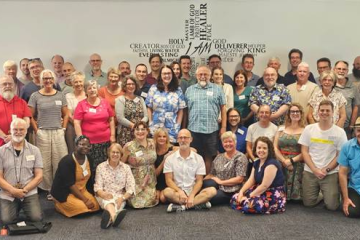Last Wednesday was ‘dirt on the face’ day! That is how Lucy Gledhill’s nephews, who used to attend a Catholic school refer to Ash Wednesday and I like it!
Ash Wednesday marks, for many Christians in many church traditions, the beginning of Lent, a season of grief (‘bright sadness’ the eastern Orthodox call it) before the joy of Easter, a time of prayer, fasting or ‘giving something up for Lent’, and generosity to those in need. It is also a time of repentance and at Ash Wednesday services people receive, as a sign of repentance, ash on their foreheads, accompanied by the words, “Repent, and believe in the Gospel,” or, “Remember that you are dust, and to dust you shall return.”
Ash Wednesday also reminds me of one of my more embarrassing church moments.
In my twenties I worked for a church aid and development program and I was invited to speak at a Catholic High School, in Sydney’s south, and it happened to be Ash Wednesday, but this had not registered in my Baptist brain because – unlike this church – most Baptists don’t pay much attention to the seasons of the church year – other than Easter and Christmas.
So, at the school, the RE teacher welcomed me and walked me to the classroom where I’d be presenting and I, very stupidly, asked, “Why does everyone have dirty marks on their faces?”
“It’s Ash Wednesday,” she said. But it was ‘dirt (or egg) on the face day’ for me!
But this is what Ash Wednesday is about – a day for realising, for acknowledging, that we human beings are frail – that we are dust – and that we fail – that we need to repent and believe in the Gospel.
In chapter nine of Field Notes for the Wilderness, Sarah Bessey talks about our need to reclaim repentance; to acknowledge we all have dirt on our faces, to make peace with others and to make peace with your own sins and regrets, to “[turn] toward the work of repentance…relearning how to confess and repent, over and over again.”
She acknowledges at the start that many people are dealing with a backlog of baggage about the word ‘sin’. For many of us, she says, that word has been used to “[manipulate] and guilt, [gaslight] and shame;” and the process of repentance has been “weaponised against us, used to control or silence.” I am sure that you, like me, can think of examples of this. Or, she says, we have experienced repentance as a meaningless exercise, “much like a kid being told to apologise to a sibling when they don’t really feel it al all: “sorry if you were hurt,” we mumble, [but]…we aren’t really sorry.” And, she says, “when faced with the real-world damage and toll of sexism, homophobia, cruelty, [racism] this wobbly notion of repentance that contents itself with ‘If feel bad and I feel sad so let’s move on” is woefully inadequate, if not sinful altogether.”
Which is why, Bessey says, we need to reclaim repentance. And why, she writes, “I find I still need [the word sin]. I need the weight and the gravity of the word, the
seriousness. Because the wilderness does eventually require us to acknowledge the gap between what we hope for ourselves and our actual behaviour…. Pointing the finger at all the ways everyone else around us needs to repent can feel cathartic until we find ourselves squarely in that same realisation: …we have our own work to do….”
This is highlighted in our reading from Luke this morning.
John the Baptist is in the desert calling people to repent, to have their sins forgiven, but when he sees the people coming in droves, when he realises, as Bessey puts it, this has become ‘the popular thing to do’, he loses it, calling them “a brood of vipers!”
Now we thought one snake – one non-venomous diamond python – crawling out of Penny and Ally’s car after camp last Sunday was bad. (I googled snakes in cars images this week. Believe you me, you do not want to do this!) But a brood of vipers sounds much worse, and what John is saying is much worse! He is telling the crowds that sin that is just covered over, sin that is not genuinely repented, is sin that shows we bear a stronger family resemblance to the devil – than to God.
John calls the people to a genuine repentance – to “bear fruits worthy of repentance”.
The word that is usually translated in our Bibles as ‘repentance’ is the Greek word metanoia – the journey of changing one’s mind, heart, self, or way of life; reforming, becoming new. Bessey writes, “It’s not simply confessing our sins, or understanding something on an intellectual level, or feeling convicted – all good things, mind you – it’s literally changing your mind and then changing your life in response.” It is thinking it through and then following it through. It is – what my dad whose birthday was today liked to point to in his dad’s Bible – two dates – the day I became a Christian and the day I started doing something about it.
But it is more than just two dates. It is every day. It is day after day. It is a journey of recognising that sin turns us away from the path of Love and repentance turns us back toward the path of Love. We are, as people of faith, Bessey writes, “invited to the continual reorientation to Love;” a reorientation that, “has implications for our relationships with ourselves, with one another, with the land, with our communities, with our world.”
There is so much that is challenging in how John responds to the crowd when they ask him, “What then should we do?” “Share!” John says, “Whoever has two coats must share with anyone who has none; and whoever has food must do likewise.” Are we on this journey of changing our minds and changing our lives in response to the
inequity and injustice in our world? Do we recognise how sin has turned us away from the path of love?
But then this passage gets more interesting because the next two groups who ask John, “What should we do?” are tax collectors and soldiers, two groups who were despised for colluding with the Roman colonial regime. What will John say to them? “Quit your jobs? Give away everything you have? Join a rebellion to overthrow the government?” No. He starts them on this journey of repentance at the place where they are, “Collect no more than the amount prescribed for you,” and, “Do not extort money from anyone by threats or false accusations and be satisfied with your wages.”
But this whole passage is interesting because it is framed in verses 1-2 (and in verses 18-20) by references to the powerful elites of the day (all those names that John Clark read so beautifully) and yet the work of preparing the way for the Lord does not begin with them. (I am thinking how appropriate it is that Jillian, a member of our congregation, is giving up speaking about Trump for Lent!) As Professor of Homiletics, Jerusha Matsen Neal writes, “consistent with Luke’s historical reframing, the halls of power are not where the real action takes place. The spiritual action happens in stables, dusty towns – and in the wilderness. It is “the people” (verse 18), not the rulers, who receive the good news.”
It is ordinary people – you and I – who are invited to this great work of repentance in our world, this great preparation for our God. As Bessey writes, “Hallelujah. And uh-oh for the status quo…. Sin can be systematic and cultural, it can be embedded in our government and manifest in our foreign policies. But just because it has a complicated root [or just because it’s wrapped around our car grill as tightly as a snake] …doesn’t mean Jesus doesn’t want to pull that thing out and set us free from it altogether.”
Repentance is hard work. It is daily work. But it is work that invites us to start where we are and ask a simple question, “What then should I do? Or what am I going to do differently?” It is work for which we need companions – good friends, or even qualified companions, Bessey suggests, a therapist or spiritual director. I think we need a congregation of companions! And it is work that invites us to the peace, the wholeness, the hope, the love, the joy of turning our feet on this journey back to the path of Love.
At the bottom of Sunday to Sunday this week, was a list of 40 Simple Practices for Lent suggested by Sarah Bessey. (I’ve put some copies down the back – though the online version has links!) For Ash Wednesday she’d included a beautiful prayer by Jan Richardson. This is another of Jan Richardson’s prayers.
Rend Your Heart A Blessing for Ash Wednesday
To receive this blessing, all you have to do is let your heart break. Let it crack open. Let it fall apart
so that you can see its secret chambers, the hidden spaces where you have hesitated to go.
Your entire life is here, inscribed whole upon your heart’s walls: every path taken or left behind, every face you turned toward or turned away, every word spoken in love or in rage, every line of your life you would prefer to leave in shadow, every story that shimmers with treasures known and those you have yet to find.
It could take you days to wander these rooms. Forty, at least.
And so let this be a season for wandering, for trusting the breaking, for tracing the rupture that will return you
to the One who waits, who watches, who works within the rending to make your heart whole.
—Jan Richardson


